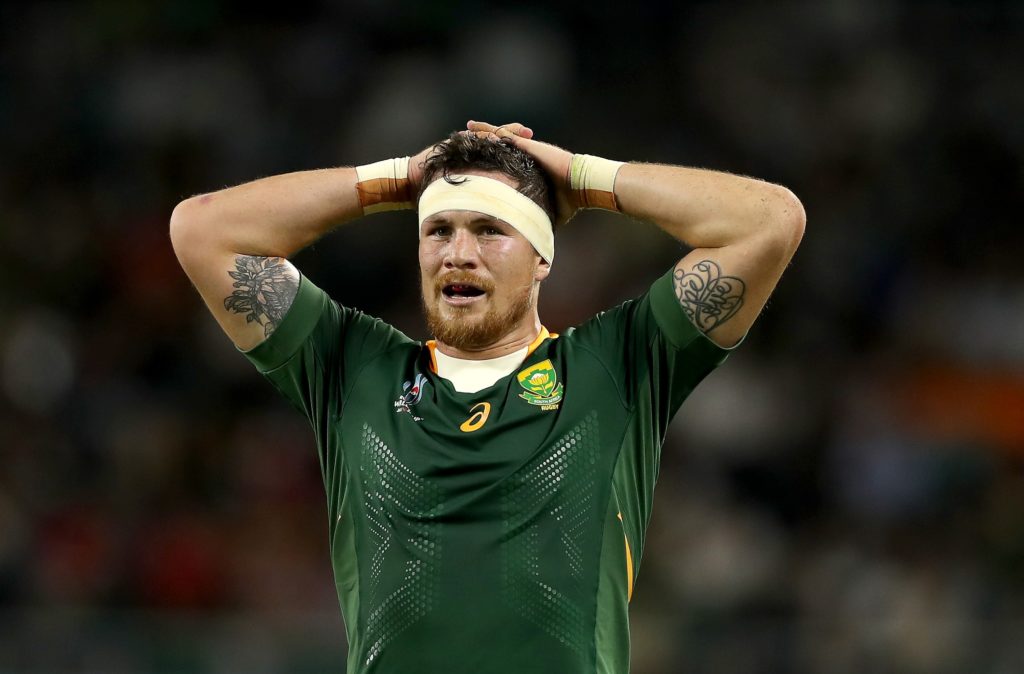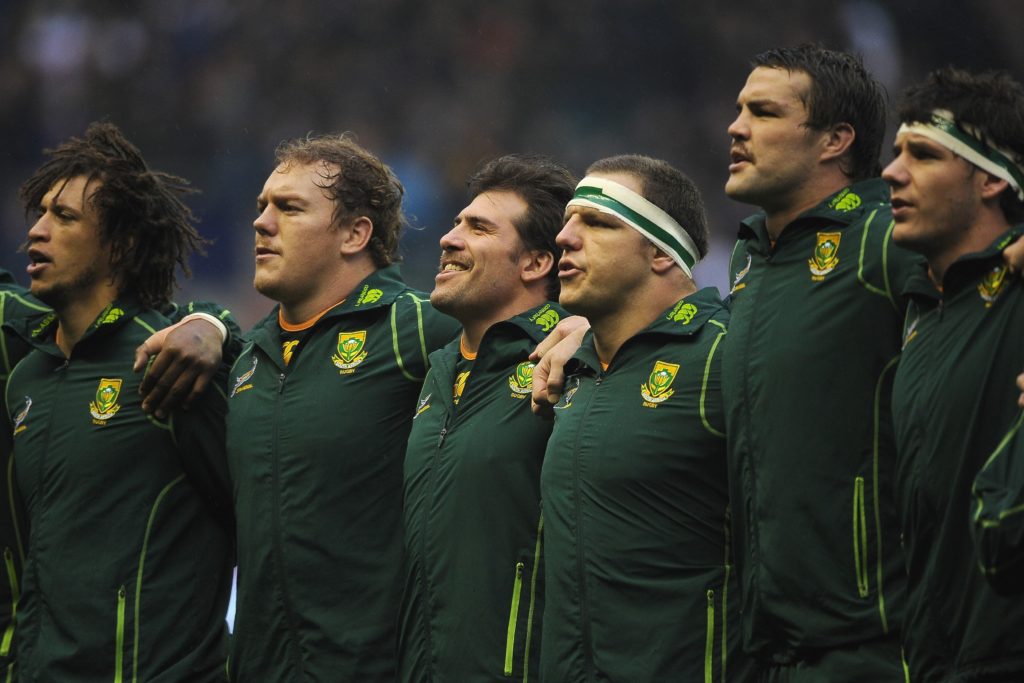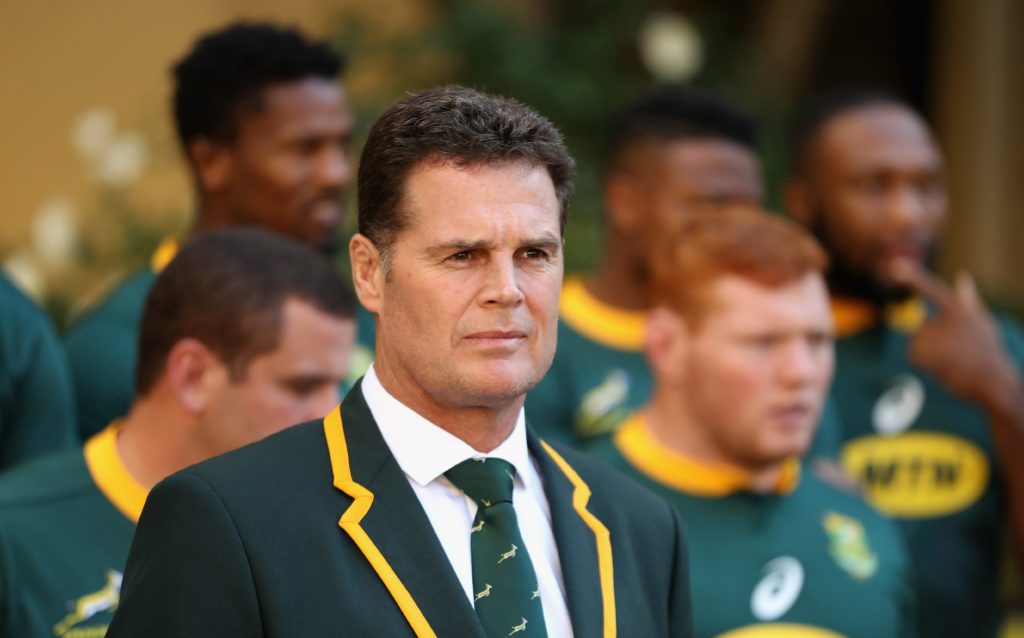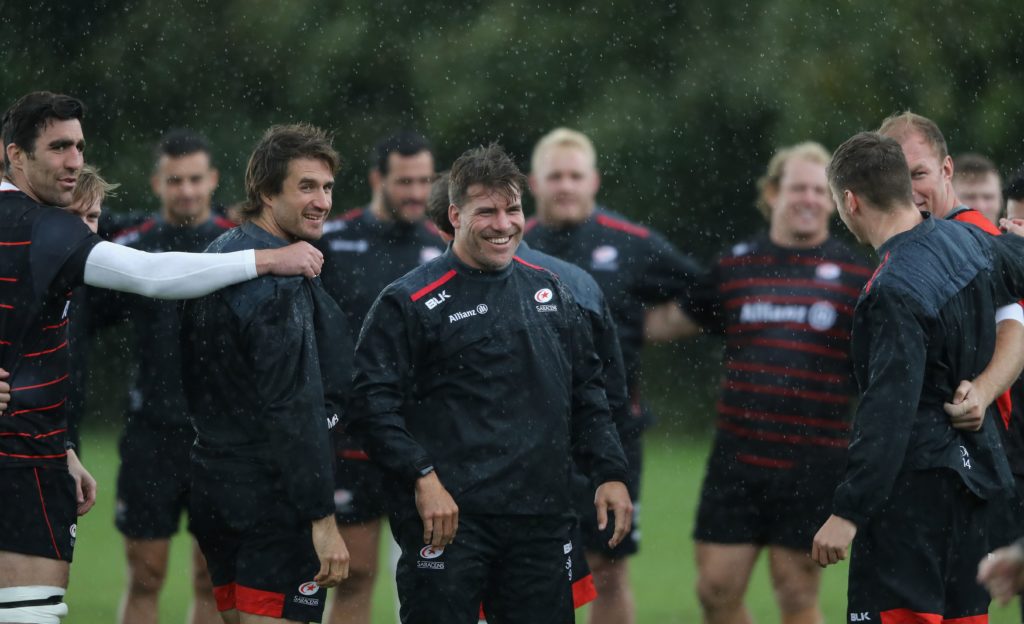Over the past few months, players around the world have been forced to adapt following substantial pay cuts and in some cases a loss of employment.
While the coronavirus and the resultant financial fallout could not have been foreseen, the crisis has certainly highlighted the vulnerability of most athletes and raised serious questions about their preparations for life after the game.
Francois Louw tells The XV why these issues are so important and why a more holistic approach to professional sport will benefit individuals as well as the industry as whole.
The former Springboks and Bath flanker, who recently qualified as a financial advisor, believes it’s his duty to spearhead a change.
“This crisis is an extreme worst-case scenario,” he says. “And yet, everyone in professional sport will have taken a lesson from the experience.
Players are putting plans into place just to survive. Some, like myself, have been forced into early retirement.
Francois Louw, World Cup winner
“Players are putting plans into place just to survive. Some, like myself, have been forced into early retirement. Others are being forced to sell assets like houses – which is not ideal given the state of the property market. What we’re seeing out there is damage control.”
The 35-year-old returned to England after the 2019 World Cup with the intent to finish his nine-year stint with Bath on a high. When the season was cut short due to rising concerns around the coronavirus, Louw pushed on with his plans to join RMS Advisory UK, a potentially game-changing business.
His financial expertise as well as his extensive experience as a rugby player may go a long way towards helping athletes in future.

“There is a gap for a holistic and bespoke service aimed at benefiting athletes at all stages of their careers, whether they are signing their first contract as a junior or getting ready for retirement,” he explains. “We want to sit down with individuals and talk about their life goals.
“I grew up in a family that made sure that I understood the value of money. As a result, I was interested in the details of my contracts when the time to negotiate arrived. I asked questions.
“Later, I had the same attitude when working with my own financial adviser. I wanted to know every detail about my investments. I understand that relatively few sportsmen and women will obsess over these details, but the old adage of ‘you reap what you sow’ has always stuck with me. If you look at what’s happening around the world today, that adage is more relevant than ever.”
SA Rugby and My Players – the players’ organisation in South Africa – have implemented a cost-saving model that will affect the high-profile franchise and Springboks players rather than those who are less well placed to cope with significant financial setbacks.
Eugene Henning, CEO of MyPlayers, admits that this model was formulated to mitigate the impact on the players as a collective rather than to cater for individual needs.
“MyPlayers manages the pension fund, contract insurance and injury insurance,” explains Henning. “We are not equipped to assess individual financial scenarios and family situations. We have recommended a panel of financial advisors that we believe can help individuals and we do try to educate players on the importance of savings and what it takes to manage your costs according to your lifestyle.
“The sophisticated planning, of course, will come through private financial advisors for individuals.
Some athletes will earn more than a CEO for a span of 10 years. How many people in their 20s, regardless of their career choice, earn as much as that? It’s unusual. Why not maximise those earnings?
Francois Louw
“Someone like Flo will make a difference,” Henning says when he’s told about Louw’s ambition to bridge the gap. “Not all financial advisors in this industry are tuned into the world of professional athletes.
“An advisor who’s had first-hand experience as a player could make a big, big contribution. What’s more, someone like Flo will have an intimate understanding of what’s being done on a group level. There are two parts to financial wellbeing in this scenario, and it would help if the advisor had an appreciation for both halves of the whole.”
Whether you’re a teenager entering into a first contract, an experienced player making an investment or a veteran planning for retirement, there is a large margin for error.
The worst mistake any player can make, says Louw, is to wait until the latter stages of their career to put a financial plan in place.
“Every player who wants to be successful must think about putting together a good team or support structure,” he says.

“That team may comprise their family members, friends, teammates, coaches and their financial advisor. If you remove any of those from the equation, your chances of realising your goals will diminish.
“Player agents are not responsible for financial planning,” he clarifies. “They may help one to land a good deal and a large sum of money, but they won’t tell you how to use that money. Players move to clubs for all sorts of reasons, and some of those reasons are financial.
“What are the players doing with that money, though, in terms of setting themselves up for the future? It’s an important question.
“Put it this way, some athletes will earn more than a CEO for a span of 10 years. How many people in their 20s, regardless of their career choice, earn as much as that? It’s unusual. Why not maximise those earnings?
“You look at the amounts earned by football players in the UK and Europe, and you can understand why so many footballers believe that they are set for life. Rugby players earn less, though, and have to think more carefully about the future.”
Louw says that he and his teammates made a lot of financial mistakes in the early stages of their professional careers.
Many young athletes fail to appreciate the true value of their first contract or recognise the importance of planning for the future. Some earning modest salaries fall into the trap of putting off a plan – or engaging an expert – until much later in their careers.
“They don’t believe that they deserve a financial advisor. There’s a perception that advisors are reserved for the super-rich. They couldn’t be more wrong,” he says.
Education is so important. From an emotional intelligence perspective, you don’t know anything when you’re 19 or 20. Your life changes when you receive a bunch of money to play rugby.
Schalk Brits, former Saracens and Springbok
Schalk Brits retired following the Springboks’ World Cup triumph in Japan. Earlier this year, Brits took up a position at Remgro, an investment holding company of which South African billionaire Johann Rupert is chairman. Like Louw, Brits wishes that someone had given him a steer during the early days of his career.
“Education is so important,” Brits says. “From an emotional intelligence perspective, you don’t know anything when you’re 19 or 20. Your life changes when you receive a bunch of money to play rugby. That is something the powers that be have to look at, advising players earlier in their careers rather than later.
“If we could improve that situation by five to 10 per cent… if someone could help the younger players to save or invest just a little bit more carefully, that would have a massive impact across lives and careers. Unfortunately, there aren’t a lot of Francois Louws out there at the moment.”
Getting athletes, especially younger men and women, to appreciate the value of money is one of the biggest challenges.
“They receive a big paycheque, and then another, and then another. Some of them don’t consider what might happen when the cashflow stops,” says Louw.
“Joe McLean is a famous financial advisor who works with a lot of the top American athletes in the NFL and NBA. These are super-wealthy individuals. His message to them when laying out a financial plan is this: ‘what does it cost to be you?’

“Essentially, you should be looking at what you want and what is necessary in your life. You should be looking at how you can scale things back and perhaps invest more in your future. You never know when the circumstances will change and when you will need to land on your feet.”
Even athletes who put money aside could benefit from expert advice. “I know of players who put their salaries straight into a savings account every month,” says Louw. “They don’t realise that the interest rate is lower than the inflation rate at present. They don’t know that they are effectively losing money every month. They may as well put that cash under a mattress.”
Some may only concern themselves with these realities when they reach the end of their careers, when they have spouses and children and are looking ahead to life after rugby. But what if you reach that point and you haven’t yet put a plan into place?
“I’ve seen it too many times,” says Louw. “Players reach the end of a long career, and are suddenly faced with the question of what to do next. They are afraid. For whatever reason, they’re not in the financial position they hoped for. They are contemplating the challenge of how they are going to generate income.
“I’ve seen a number of studies linking physical performance to mental wellbeing. It’s important that players don’t find themselves in a position where their financial stress is affecting their mental wellbeing and in turn their performance on the field.
Rugby players are cash-rich. Some players become asset-rich, in that they buy houses and cars. But what most don’t realise is that a house doesn’t generate money. Your cashflow stops when your career ends.
Schalk Brits
“It can have a negative effect on a career, especially toward the end, where an individual may have so many different responsibilities.”
Even Brits – who enjoyed an immensely successful club career with Saracens and won the 2019 World Cup with the Boks – has endured his fair share of financial challenges.
If the players who are taking precautions and planning for the future are susceptible, one can only imagine how those without plans in place must suffer.
“Rugby players are cash-rich,” says Brits. “The cash rolls in on a regular basis and expenses are not a problem. Some players become asset-rich, in that they buy houses and cars. But what most don’t realise is that a house doesn’t generate money. Your cashflow stops when your career ends, but you still have to pay expenses.
“You don’t want to get into a situation where you’re forced to sell assets like your house. You don’t want to get to a point a few months later when you have no assets left as well as zero cashflow.”
Times are changing in that many unions and coaches have adopted a holistic approach towards managing their players.
Last year, South Africa’s director of rugby Rassie Erasmus asked Henning, the players’ representative, to join the Springboks for the duration of the Rugby Championship and World Cup tournaments.
Erasmus wanted the players to have access to their representative and to deal with any off-field issues in real-time. Ultimately, Erasmus understood that a player who is happy off the field will perform better on it.

“It wasn’t always that way,” says Brits, who began his career with Western Province in the early 2000s. “When I was coming through the junior ranks, I asked one of the coaches if he would give me some time off to write an accountancy exam. He made the point that the union was paying me to play rugby and that rugby should be my priority.
“The upshot is that I decided to give the exam a miss to go on a pre-season camp with the team instead. I ended up spending a lot of time and money to redo the course at a later stage.
“Thankfully the mindset is changing some 15 or 20 years later. I believe that even more can be done. We shouldn’t be pushing 19 or 20-year-olds to sacrifice everything to make an early start in rugby. In the USA, the top athletes are encouraged to go to college or university and get a degree before they go on to play in the NFL or the NBA.
“That is how it should be. Players should have the chance to grow a bit and to get something behind them before they commit to sport.
“One thing I picked up at the Boks is how big Rassie Erasmus is on personal development. He understands that we are people first and rugby players second, and that we have lives outside the game.
“That’s why we were such a tight and happy group at the World Cup. Every player has day-to-day challenges and problems, even when they are at a World Cup, and Rassie gave players time to address those.”
Henning has been in the South African rugby system for more than a decade. He believes that coaches and managers are far more aware of issues such as mental health and financial wellbeing than they were in the past.
Saracens have taken a lot of flak recently, but one thing they do deserve credit for is the way they have prepared their players for life after rugby.
Schalk Brits
Since 2015, SA Rugby and MyPlayers have taken steps to help players develop so that they are better placed to transition to the working environment down the line.
“Every player who enters the professional rugby system will do a psychometric test and then sit with a player development manager to discuss a plan for his or her career,” the MyPlayers CEO says. “Towards the end of those careers, the player development managers will do all they can to place them in jobs or positions after their retirement. Everyone, from us at MyPlayers to the respective unions, is made aware of each individual plan.
“That alignment and sharing of information is so important. If the player moves from the Stormers to the Bulls, for example, that plan cannot disappear.”
Louw believes that the players should face up to the question about what comes next sooner rather than later. Some may need to accept that the answer is related to what they financially need rather than what they personally want.
“Everyone would like to follow their passion after playing, but sometimes that passion isn’t going to pay the bills. This is why it is so important to work closely with someone who can help you plan and set your goals.”

Some clubs and unions have gone as far as to spell out the reality of the transition in brutal terms.
“Saracens have taken a lot of flak recently, but one thing they do deserve credit for is the way they have prepared their players for life after rugby,” says Brits.
“We were encouraged to think about the future. We were told that 67 per cent of players go into financial difficulties in the first three years post-retirement.
“For players such as myself and Flo, who enjoyed long careers in rugby, the transition will always be difficult. Some players transition on their own terms and some don’t. It’s good to line up a job or to get some sort of work experience while you are still playing.
“That can put a lot of stress on a player to juggle everything at once. Nevertheless, every player has to think about these things sooner rather than later.
“Another thing to consider is whether you are already qualified to pursue a particular opportunity. I was qualified on the accountancy front when I landed my job, but it was important that my company gave me time to grow into my new role.
“I studied accountancy at Stellenbosch about 15 years ago. Obviously it’s taken some time to get up to speed. I’ve tried to keep tabs on the industry and to gain as much experience as I could during the latter stages of my career, but that was never going to be the same as doing the job eight to five. I had a lot of catching up to do.
“Making the jump from professional rugby to the corporate world during a global crisis has made it even tougher,” Brits adds. “I’ve had to take on more studies. I’ve had to grow and develop in other ways. I’ve been fortunate in that Remgro has been patient and allowed me to settle in this manner. I don’t know if all companies would have been so accommodating in a situation like this.”
The need for a guiding light has never been greater than in these dark and uncertain times. Louw hopes that his company, as well as its South African partner – RMS Advisory in Cape Town – will illuminate the way for athletes in the years to come.
“I’ve made a lot of mistakes myself,” Louw admits. “I’ve seen players living the good life, albeit from month to month, and then struggling at the end of their careers. I truly believe that it will help to have someone who has walked the walk giving the talk to men and women in the industry. I’ve seen all the lows and the highs – and now I’m in a position to help.”
If you’ve enjoyed this article, please share it with friends or on social media. We rely solely on new subscribers to fund high-quality journalism and appreciate you sharing this so we can continue to grow, produce more quality content and support our writers.


Comments
Join free and tell us what you really think!
Sign up for free